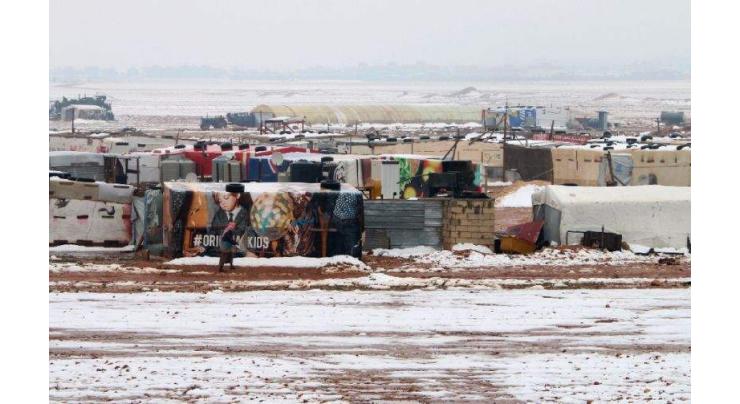
Over 50,000 Syrian Refugees In Lebanon Jeopardized By Storm Norma - UNHCR
Fakhir Rizvi Published January 08, 2019 | 11:41 PM

The flooding, heavy winds and severe drops in temperature in Lebanon affected the spontaneous camps of Syrian refugees in the majority of the country's areas, with over 50,000 people remaining in at-risk zones, the Office of the UN High Commissioner for Refugees (UNHCR) said in a report obtained by Sputnik.
A heavy storm dubbed Norma hit Lebanon at the end of last week seriously damaging 66 and completely destroying 15 refugee camps.
"UNHCR and partners estimate that approximately 850 informal settlements, hosting 50,000 refugees, are at risk of flooding. The response is coordinated by the Ministry of Social Affairs and UNHCR, in close cooperation with affected municipalities," the report read.
According to the UNHCR, the camps suffered the most damage as a result of heavy rains, snowfalls and winds.
"Efforts to pump out water accumulating in informal tented settlements in the Bekaa are ongoing. It has proved to be a challenging task as water keeps pouring back due to the fact that some informal settlements are located below the level of the road and continuous rainfall continues to accumulate. Both in the North and the Bekaa, alternative sites have been identified to accommodate families affected by the storms," UNHCR said, adding that some of the refugees have been sheltered in nearby schools and mosques.
Ahead of the winter season the UNHCR office in Lebanon reported that about 740,000 Syrian refugees might face risks to health due to upcoming cold snap since many of them did not have money for warm clothes and were not able to bear the costs of heating and medical care.
Recent Stories

Currency Rate In Pakistan - Dollar, Euro, Pound, Riyal Rates On 24 April 2024

Today Gold Rate in Pakistan 24 April 2024

Punjab CM inaugurates Pakistan’s first Virtual Women Police Station

Dutch model Donny Roelvink embraces Islam

Experts raise concerns over introduction of 10-stick packs

Iranian president arrives in Karachi

Law Minister expresses Govt's resolve to address issue of missing persons

Rizwan’s batting order may be changed: Sources

Nawaz Sharif to visit Guangzhou exhibition in China

FM Dar not traveling to China: Foreign Office

PM takes notice of deliberate delay in tax cases

Iranian President visits Allama Iqbal’s mausoleum
More Stories From World
-
Long-delayed Ukraine aid clears US Congress, awaits Biden signature
2 seconds ago -
Up the Congo River on an eventful voyage aboard 'God's Miracle'
11 seconds ago -
A 'healthy addiction': sea saunas make waves in Ireland
16 seconds ago -
Victims of China floods race to salvage property
20 minutes ago -
China to send fresh crew to Tiangong space station
60 minutes ago -
Norman says McIlroy welcome on LIV Tour, but denies any offer
1 hour ago
-
China, future HQ: New ASML boss faces bulging in-tray
1 hour ago -
Trump meets former Japanese prime minister in New York
1 hour ago -
'Catch and Kill' architect details Trump-boosting scheme
1 hour ago -
Wolves overpower Suns to lead series 2-0, Pacers down Bucks
1 hour ago -
Top price predicted for long-lost Klimt portrait at Vienna auction
1 hour ago -
Maduro announces return of UN rights office to Venezuela
2 hours ago